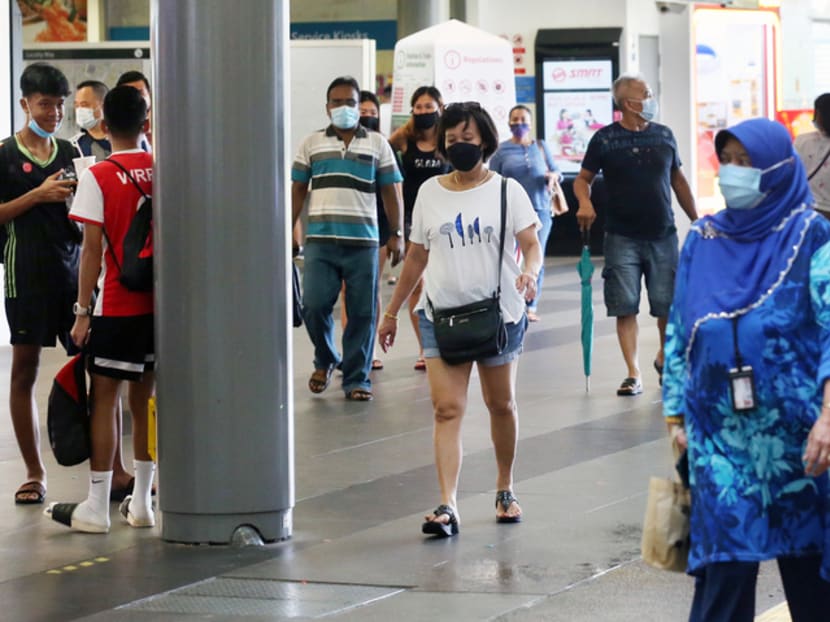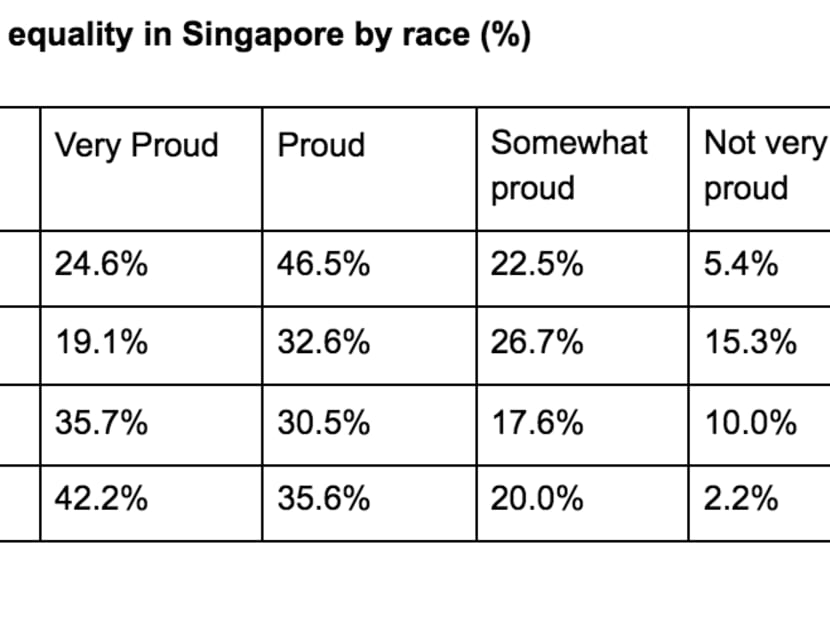Malays, Indians less proud of racial equality in Singapore but no evidence to show they feel marginalised: IPS report
SINGAPORE — Asked in a survey if they were proud of racial equality in Singapore, 21.7 per cent of Malays and 16.6 per cent of Indians indicated they were “not very proud” or “not proud at all” — relatively large proportions compared to Chinese respondents (6.4 per cent) and those from other races (2.2 per cent).

The Institute of Policy Studies survey looked at sources of pride among Singaporeans and permanent residents.
- These are among the findings from an Institute of Policy Studies (IPS) report released on Thursday
- The report also showed that 21.7 per cent of Malays and 16.6 per cent of Indians indicated they were not proud of racial equality, lower than what other races indicated
- The authors of the report say that there is insufficient evidence to indicate that minorities here feel marginalised
- Those of higher socio-economic status or who are higher educated were also found to be the least proud of meritocracy
- Singaporeans and PRs surveyed were most proud of the healthcare system and cleanliness, but least proud of the treatment of migrant workers and press freedom
SINGAPORE — Asked in a survey if they were proud of racial equality in Singapore, 21.7 per cent of Malays and 16.6 per cent of Indians indicated that they were “not very proud” or “not proud at all” — relatively large proportions compared to Chinese respondents (6.4 per cent) and those from other races (2.2 per cent).
These are among the findings from an Institute of Policy Studies (IPS) report released on Thursday (Sept 23), which sought to understand national identity and pride in Singapore.
Respondents were asked, among other questions, to indicate on a five-point scale if they were very proud, proud, somewhat proud, not very proud or not proud at all of racial equality here.
The report showed that only 19.1 per cent of Malay respondents indicated they were “very proud” of racial equality, compared to 24.6 per cent of Chinese, 35.7 per cent of Indians and 42.2 per cent of respondents of other races.
However, other findings from the report indicate that there is insufficient evidence to conclude that minorities here feel marginalised, one of the report’s authors said.

The report sought, among other things, to uncover Singapore’s “sources of pride”. There were 24 sources established, one of them being “racial equality”. Other sources included those related to the Government — such as Singapore’s healthcare system, military and education system.
The sources of pride also included Singaporean characteristics such as competitiveness and environmental consciousness.
Another source of pride that the researchers emphasised was that of “level of meritocracy”, where it was found that those who had benefited most from meritocracy — those of higher socio-economic status or who are higher educated — were least proud of it.
INSUFFICIENT EVIDENCE TO SHOW MINORITIES HERE FEEL MARGINALISED: RESEARCHER
While Malays were less proud of racial equality compared to other races, the authors of the report say that there is insufficient evidence to indicate that Malays here feel marginalised.
In another part of the study, respondents were asked “how close do you feel to people of your race” and also “how close do you feel to Singapore”.
Respondents were to answer according to a four-point scale of “very close, close, not very close and not close at all”.
For Malays, 59.1 per cent indicated that they felt “very close” to people of their race and 55 per cent indicated they felt “very close” to Singapore.
“The results suggest that Malays were more likely to feel close to both (their) racial group and Singapore, with approximately equal proportions who felt very close to both,” read the report.
For the other races, they felt much closer to Singapore than to their ethnic group.
For Chinese, 31 per cent felt very close to their race, while 52 per cent felt very close to Singapore. For Indians, the figures are 46 per cent and 69.7 per cent respectively and for other races they are 31.1 per cent and 66.7 per cent respectively.
Speaking at a media conference on the report on Thursday, one of the four authors of the report, Dr Mike Hou, said: “Strong levels of both ethnic and national identity actually indicate a healthy level of integration (but) if you have a case where a group has a much higher level of ethnic identity compared to their national identity, then that may indicate marginalisation.
“That could be a cause of concern, but that’s not the data we are seeing now.”
Another finding was that both Indians (46 per cent) and Malays (59.1 per cent) felt “very close” to their race compared to the Chinese (31 per cent).
The percentage of Malays (55 per cent) and Indians (69.7 per cent) who felt very close to Singapore is also higher than for the Chinese (52 per cent).
Associate Professor Tan Ern Ser, another of the report’s authors, said that this could be because the Chinese may “tend to take their national identity for granted” as they are the majority.
“Maybe for the minority, they have to work harder at claiming the Singaporean identity, whereas for the Chinese (who are) the majority, they don't have to,” he said.
“The position of being a majority or minority, it does matter.”
‘INEQUALITY OF OPPORTUNITY’ VS MERITOCRACY
Another finding that the researchers noted was that those of higher socio-economic status or who are higher educated were least proud of meritocracy in Singapore.
Like for the “racial equality” source, respondents were asked to indicate how proud they were of Singapore’s “level of meritocracy”.
Only 9.2 per cent of higher socio-economic status respondents were “very proud” of meritocracy here, compared with 19.3 per cent of lower socio-economic status and 12.5 per cent of mid-level socio-economic status respondents.
The socio-economic status of respondents was determined through their housing. Those who live in three-room public housing are considered lower level, those who live in four- to five-room public housing are considered mid level, and those who live in private property or landed property are considered higher level.
Of higher-educated respondents, 47.8 per cent were proud or very proud of meritocracy in Singapore, compared with 49.7 per cent of mid-educated and 56.6 per cent of lower-educated respondents.
Those of lower education levels are those who had attained an education level of secondary school and below, mid-educated respondents had attained at least a post-secondary diploma and those who are higher-educated had attained a degree and above.
Similar to the “level of meritocracy” source, the higher educated were slightly less likely to be proud of racial equality in Singapore. Two-thirds or 67.3 per cent of higher-educated respondents indicated that they were proud or very proud of racial equality, compared with 74 per cent of lower-educated respondents who indicated the same.
Speaking at the media conference, another author of the report, Dr Mathew Mathews, said that the critique on issues such as meritocracy and inequality resonate more with people who are higher-educated and younger.
“People are more socially conscious, especially if you are better educated, you have a lot of consumption of media, you've been thinking through some of these issues,” he said.
He added that despite being in a “position of advantage”, those with higher social economic status and who are higher educated believe that there needs to be a more level playing field in society.
“Meritocracy is not the problem. The problem is actually inequality of opportunity,” Assoc Prof Tan Ern Ser added.
He said that it is a “contradiction” that the ones who had benefited from meritocracy are the least proud of it.
“I'm sure we want to be rewarded by merit, and not by any other criteria, like connections… we just want to make sure that everyone has a more or less equal chance of making it.”
WHAT ABOUT SINGAPORE THEY WERE MOST AND LEAST PROUD OF
Of the 24 sources of pride, the top sources where Singaporeans indicated they were either very proud or proud are the healthcare system (83.8 per cent), Singapore's cleanliness (76.4 per cent) and the military (78.7 per cent).
The researchers noted that a slight majority of 56.5 per cent were proud or very proud of Singapore's justice system, but said that the results must be “taken with caution as the survey went into the field just after the highly publicised acquittal of Parti Liyani”.
“The verdict by the High Court in overturning the District Court’s judgement and the subsequent public discourse cast serious questions about the prosecution’s handling of the case and whether there were sufficient safeguards to ensure fair trials for migrant workers,” the report read.
The lowest scoring sources include sporting achievements (42.6 per cent), the arts (39.4 per cent), the treatment of migrant workers (34 per cent) and press freedom (31.8 per cent).
Higher-educated respondents, in particular, were the least proud of the treatment of low-wage migrant workers.
Among them, 26.4 per cent were proud or very proud of treatment of low-wage migrant workers, as compared with 35.7 per cent of mid-educated and 44.4 per cent of lower-educated respondents.
Higher-educated respondents were also less proud of levels of press freedom in Singapore, with only 22.1 per cent of them proud or very proud of levels of press freedom, compared with 34 per cent of mid-educated and 45.1 per cent of lower-educated respondents.








